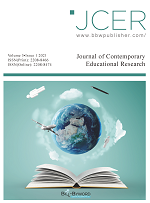Evolution Characteristics of the Information Literacy Education Policy for Chinese College Students
Abstract
In order to cultivate information literacy among college students, the Chinese government has formulated a series of relevant policies as well as revised and adjusted the policy priorities along with the times. Guided by co-word and social network analysis, this study analyzes 170 policy texts that have been promulgated by the Chinese government from 1981 to 2020. Based on the clustering results of high-frequency keywords, this study explores the characteristics of policy evolution and its influencing factors from three dimensions: policy themes, contents of information literacy education, and the methods for cultivating information literacy education. Several suggestions have also been put forward in this article to improve the information literacy education policy for Chinese college students.
References
Xiao X, 2021, On the Theoretical Origin, Connotation and Components of Information Literacy – Also on International Experience of Information Literacy Education. e-Education Research, 42(08): 116-121, 128 [In Chinese].
Department of Science and Education, National Sports Commission, 1993, Selected Documents of Current Higher Education 1980-1992, Beijing Institute of Physical Education Press, Beijing, 572 [In Chinese].
The Ministry of Education, 2002, Notice of the Regulations for Libraries of General Institutions of Higher Education (Revised). Ministry of Education Political Daily, (04): 156-160 [In Chinese].
The Central Committee of the Communist Party of China (CPC), 2010, The State Council Issued the National Medium and Long-Term Education Reform and Development Plan (2010-2020). People’s Education, (17): 2-15 [In Chinese].
Sha H, Li M, 2020, A Review of Research on College Students’ Information Literacy Education from the Perspective of Educational Informationization 2.0. Jiangsu Higher Vocational Education, 20(01): 105-109, 115 [In Chinese].
Zhang C, Guan J, 2020, Research on the Evolution of a Policy System by the Content Analysis on Policy Texts: Evidence from the Innovation and Entrepreneurial Policy System in China. Management Review, 32(05): 138-150 [In Chinese].
Zheng S, Peng R, Gao C, 2019, The Logic of Change and Prospect of Environmental Policy of China: Based on Co-word and Cluster Analysis. Journal of Jishou University (Social Sciences), 40(02): 7-20 [In Chinese].
Cheng RM, 2017, An Analysis of Information Literacy Co-authorship Networks in China Based on the Social Network Analysis Method. Library Science Research & Work, (09): 51-56 [In Chinese].
Zhao G, Liu J, Wu Y, et al., 2019, Research on Co-word Network of Guangdong Science and Technology Financial Policy Based on Grounded Theory and Text Mining. Science and Technology Management Research, 39(03): 51-57 [In Chinese].
Hu A, 2018, The Research of Online Information Literacy Education of Hainan Based on Constructivism Learning Theory. Journal of Academic Library and Information Science, 36(03): 115-119 [In Chinese].

